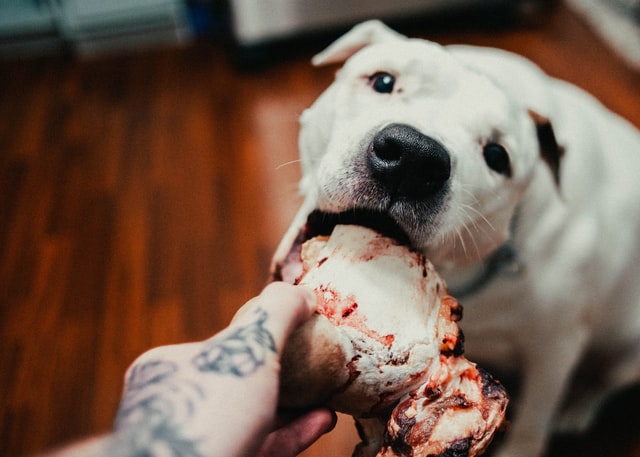Not all dog foods are created equal. In fact, there are dog foods specifically formulated for puppies, senior dogs, and small breeds. But what do you do if you have a large dog? And, do big breeds eat a lot more? And, how do you know what and how much to feed them? Here’s what you need to know to make the perfect diet plan for your pup.
Talk To Your Veterinarian
First, you should always talk to your dog’s veterinarian before deciding on your dog’s diet. Why? For one, their veterinarian can help you find the correct food for them. But also, you’ll learn if your dog has any specific dietary needs, has allergies, or needs a certain serving size.
For example, some experts and veterinarians recommend a low fat diet for large dog breeds, especially if they have a higher opportunity at becoming overweight or obese. But that doesn’t mean that every large dog needs to be fed a low fat diet. However, a larger dog, especially if more active, will need more calories than a smaller dog. A veterinarian will tell you where to keep your dog’s daily caloric intake.
Last but not least, it’s important to know the nutrients, vitamins, and minerals that your big breed will need. Many large breeds have joint and bone problems throughout their life. A diet higher in Calcium, Iron, and Vitamin D can help keep your dog from being deficient and making those joint and bone problems worse.
Use The Proper Food During Each Stage Of Life
Even with dog food formulas made for big dogs, there are still differences in the recipes for puppies, adults, and seniors. And, if your dog has allergies, digestive issues, or needs a special diet, that will affect the type of food they need as well. This all leads to choosing the best dog food based on your dog’s current needs.
Did you know that large and giant breeds typically don’t reach adulthood until about 18 months? Unlike smaller dogs, they need a little more extra time to grow. So, instead of switching your puppy to adult dog food right at 12 months like you would a smaller breed, you’ll need to keep them on puppy food for a while longer.
And of course, larger dogs also tend to reach their senior years faster than small dogs. In fact, many bigger dogs have a lifespan of only 7 to 12 years. So you’ll need to switch to senior dog food faster than you would with a smaller dog.
Look At The Size Of The Food
Have you ever seen kibble from different brands or formulas? Some dog food is small and round, while others are larger disks. And yes, size really does matter when it comes to your dog’s food.
Your dog will enjoy their food more when their food fits in their mouth properly. Plus, for large breeds, the larger food pellets allow them to chew their food versus just swallowing it whole. Thus, this helps your dog eat their food slower and could help keep them from eating too fast and overeating.
When your dog is a puppy, you may be able to get away with smaller sized kibble. Just be sure that if your pup is eating too fast, that you adjust their portions or get dog food with larger pieces. Puppies can choke if they swallow too much kibble at once, even if the food is small.
Another way to keep your big breed from overeating or wolfing down their food is to focus on the container that their food is in. While the size of the food matters, so does the container that holds the food. If your dog has a habit of eating too fast or choking on food, try a slow feeding food bowl.
Always Measure Out Their Food
Last but not least, you’ll need to measure out the proper serving size for your dog. Just because they are a bigger breed, it doesn’t mean that they can eat food all day, every day. On almost all bags of commercial dog food, you’ll even find their recommended serving size for your dog.
If making homemade food, feeding canned food, or if the food you purchase for your dog doesn’t have a recommended serving size, talk to your vet. They can help you come up with a diet plan and the proper serving size of food for your dog.
You’ll also need to update how much you feed your dog and how often as they grow. While a pup may only need 2 cups of food, an adult that’s 100 pounds may need 4 cups or more of dog food a day. Also, if your dog is highly active, they may need more food as well. These are all questions to ask your veterinarian when creating the perfect diet plan for your dog.
Here are some of the recommended serving sizes for popular big breeds:
- English Mastiff (120 to 130 pounds): 6 to 10 cups of food a day
- Great Dane (110 to 175 pounds): 5 to 10 cups of food a day
- Saint Bernard (120 to 180 pounds): 6 to 7 cups of food a day
- Bernese Mountain Dog (70 to 115 pounds): 3 to 6 cups of food a day
- German Shepherd (70 to 100 pounds): 3 to 5 cups of food a day
Do Big Breeds Eat A Lot? The Perfect Diet
As you can see, most larger dogs do in fact need a lot more food than their smaller counterparts. While talking to your veterinarian will help you decide on the type of food and serving sizes, it’s important to remember that your large breed will eat more.
This can seem like a lot of you’re not used to large dog breeds, or if your dog is highly active and always seems hungry. But trust that their bodies were made to eat more, and as long as you’re feeding them nutritious and appropriate dog food, they should be just fine.



